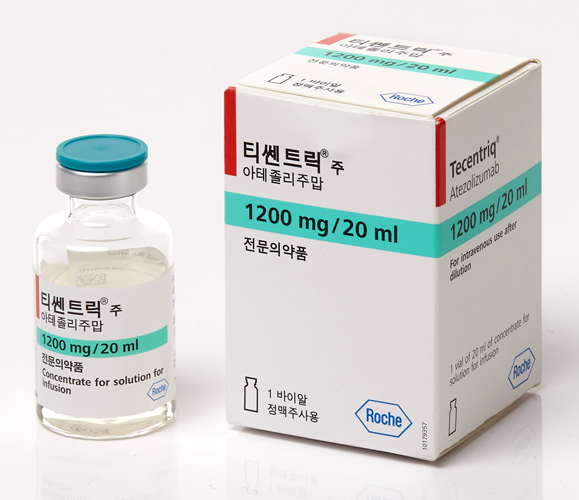Roche said Tecentriq, its immunotherapy treatment, will receive reimbursement as a second-line treatment for non-small cell lung cancer (NSCLC) and urothelial carcinoma regardless of PD-L1 expression.

Until now, the health insurance agency has reimbursed Tecentriq only when the patient had a PD-L1 occurrence rate of 5 percent or more.
With the newly approved insurance benefit, however, the drug has become the first immunotherapy in Korea to offer reimbursement benefits regardless of PD-L1 expression to patients with NSCLC and urothelial carcinoma who have failed platinum-based chemotherapy.
The company expects that it will significantly improve the accessibility of patients to its immunotherapy.
The Health Insurance Review and Assessment Service has approved the reimbursement plan after Roche confirmed the treatment's efficacy in phase 3 clinical trial.
The phase 3 OAK trial revealed that Tecentriq improved overall survival compared to docetaxel when used as second-line therapy for NSCLC after platinum-based chemotherapy. The median overall survival (mOS) was 13.8 months for the Tecentriq group, while the docetaxel showed the mOS of 4.2 months. Crucially, the drug had a benefit regardless of whether patients' tumors tested positive for PD-L1.
In a separate phase 2 “IMvigor210 Cohort 2” clinical study, the treatment also showed an objective response rate of 16 percent in patients with locally advanced and metastatic urinary tract carcinoma who have failed platinum-based chemotherapy regardless of PD-L1 expression rate.
The company also confirmed that 6 percent of those that showed objective response to the treatment had a complete response. The mOS and 12-month survival rate were 7.9 months and 37 percent regardless of the PD-L1 incidence.
"The expanded reimbursement for Tecentriq is very significant in that it has greatly improved the therapeutic accessibility for NSCLC and urothelial carcinoma alienated from the opportunity to treat the disease despite the proven clinical efficacy," Roche Korea CEO Nic Horridge said.
Asan Medical Center Professor Kim Sang-we also said, "Although many NSCLC patients in clinical trials have demonstrated clinical efficacy regardless of PD-L1 expression, they had to discontinue the immunotherapy as they did not meet the PD-L1 requirement for reimbursement."
The expansion of the Tecentriq insurance benefit will provide meaningful momentum, which, in turn, will significantly improve patients' access to immunotherapy, he added.

